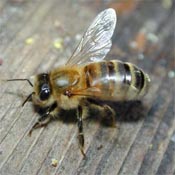Plants Are Protected From Other Insects By The Buzzing Bees
 It has been found by the scientists that the buzzing of bees is actually good for the plants since they are protected from other insects that can eat them.
It has been found by the scientists that the buzzing of bees is actually good for the plants since they are protected from other insects that can eat them.
The new study says that the buzzing sound made by the bees scares off insects like caterpillars that otherwise would eat the plants. In this sense, bees act as unofficial 'bodyguards' to the plants.
It has also been advised by the researchers that farmers should grow flowers next to some crops to help deter other insects and possibly even increase yields.
Very fine hair are carried by Caterpillars on the front of their bodies which alert them to differences in the movement of air, and these even include the sounds of approaching insects such as bees. It should be noted that the insects could not determine the difference between the approach of a bee and that of a predatory wasp.
The study published in the journal, Current Biology says that both cause the caterpillars to become stressed and less likely to eat the vegetation.
Jurgen Tautz of Biozentrum University, in Bavaria, Germany informed, "These sensory hairs are not fine-tuned. Therefore, caterpillars cannot distinguish between hunting wasps and harmless bees. If an insect which they cannot identify generates air vibrations the caterpillars stop moving or drop away from the plant."
It was also discovered by the research that sweet peppers grown in a tent with bees suffered 60 to 70 percent less damage from caterpillars than those not exposed to bees.
Dr Tautz said, "Our findings indicate for the first time that visiting honeybees provide plants with a totally unexpected advantage. They not only transport pollen from flower to flower but in addition, also reduce plant destruction by herbivores."
As of now, the team is planning to carry out further research into whether placing attractive flowers near to crops which are often bothered by pests, could lead to higher agricultural yields.
He concluded, "Our finding may be the start of a totally new biological control method."